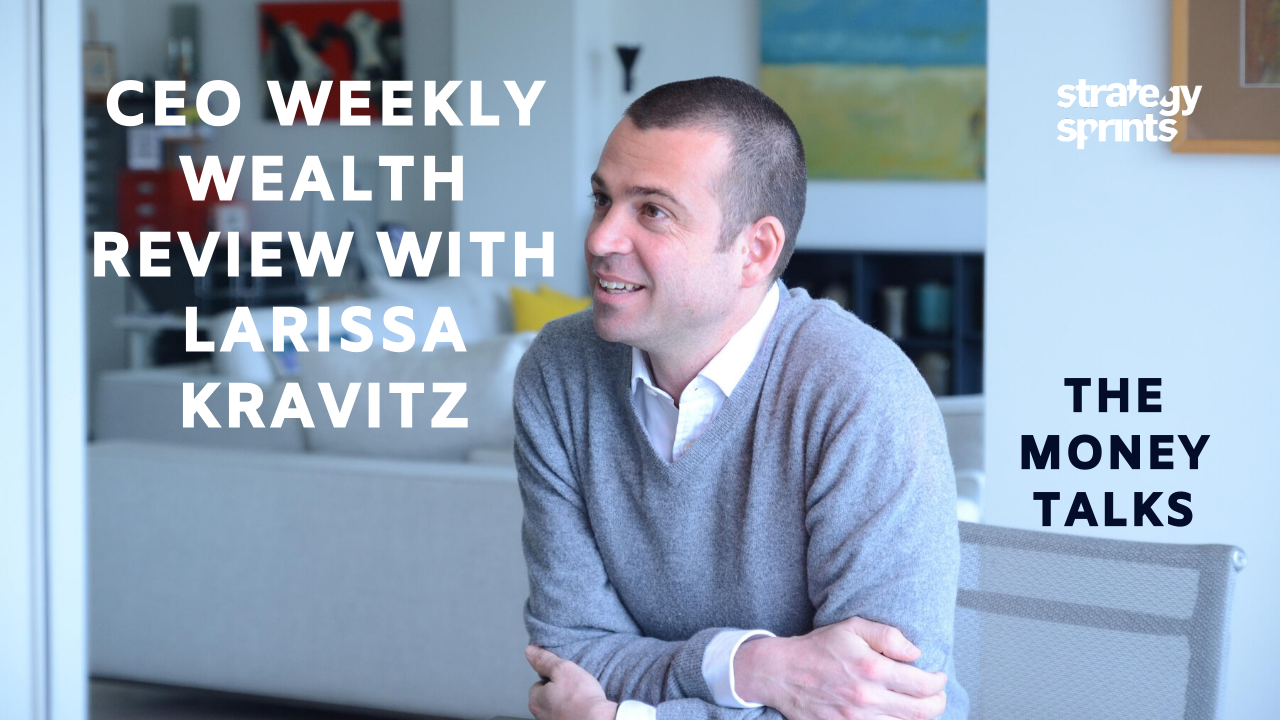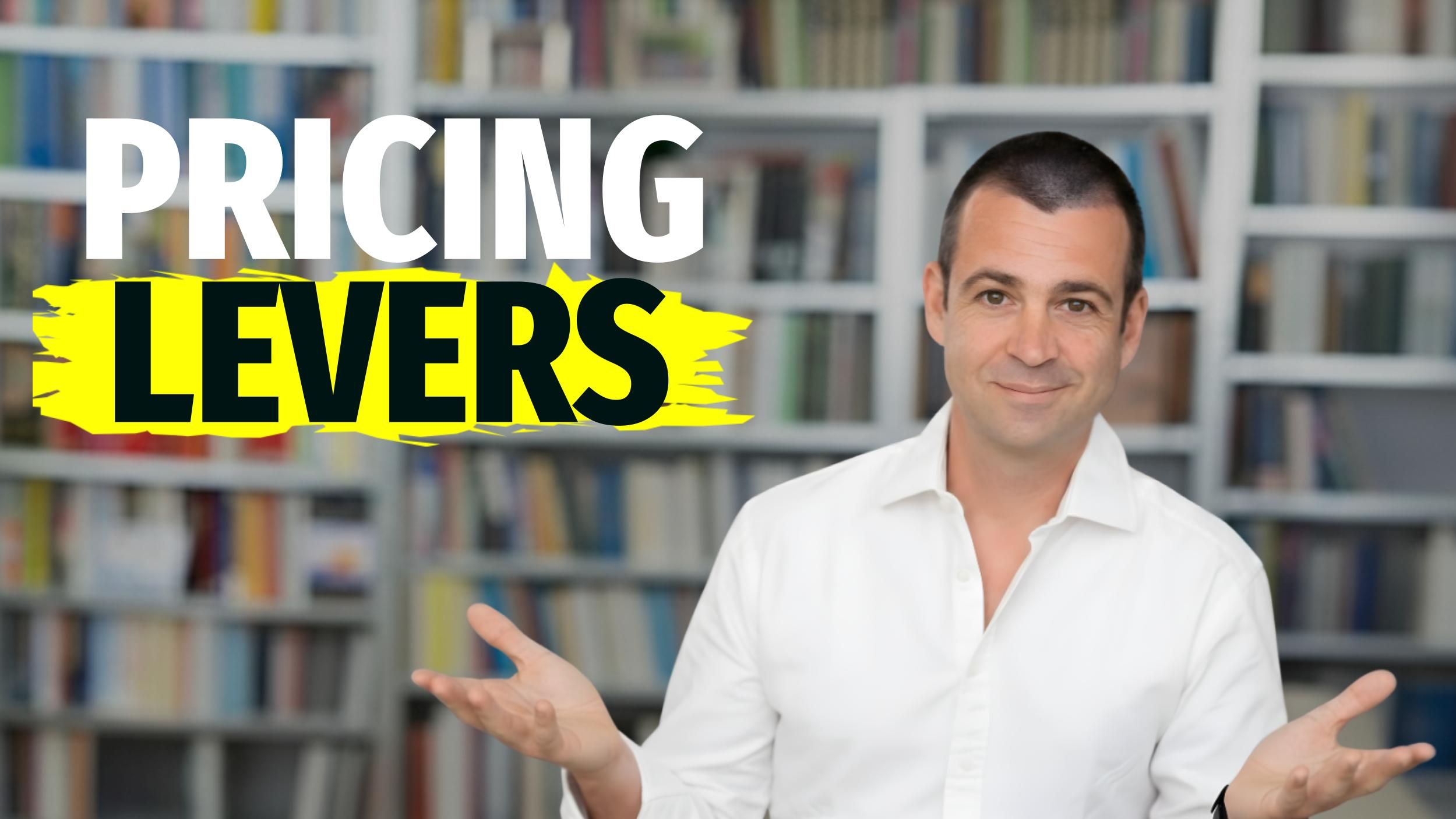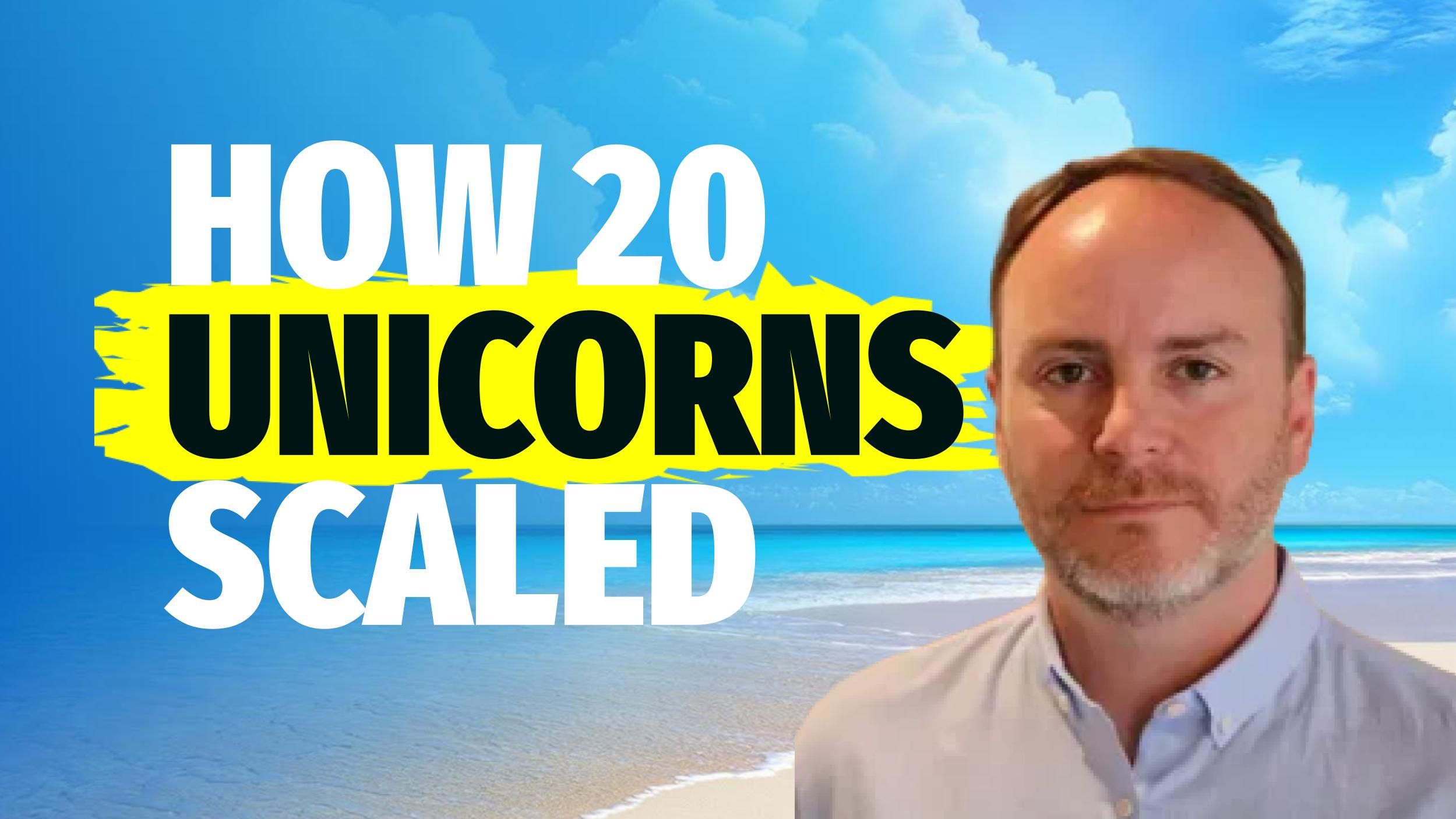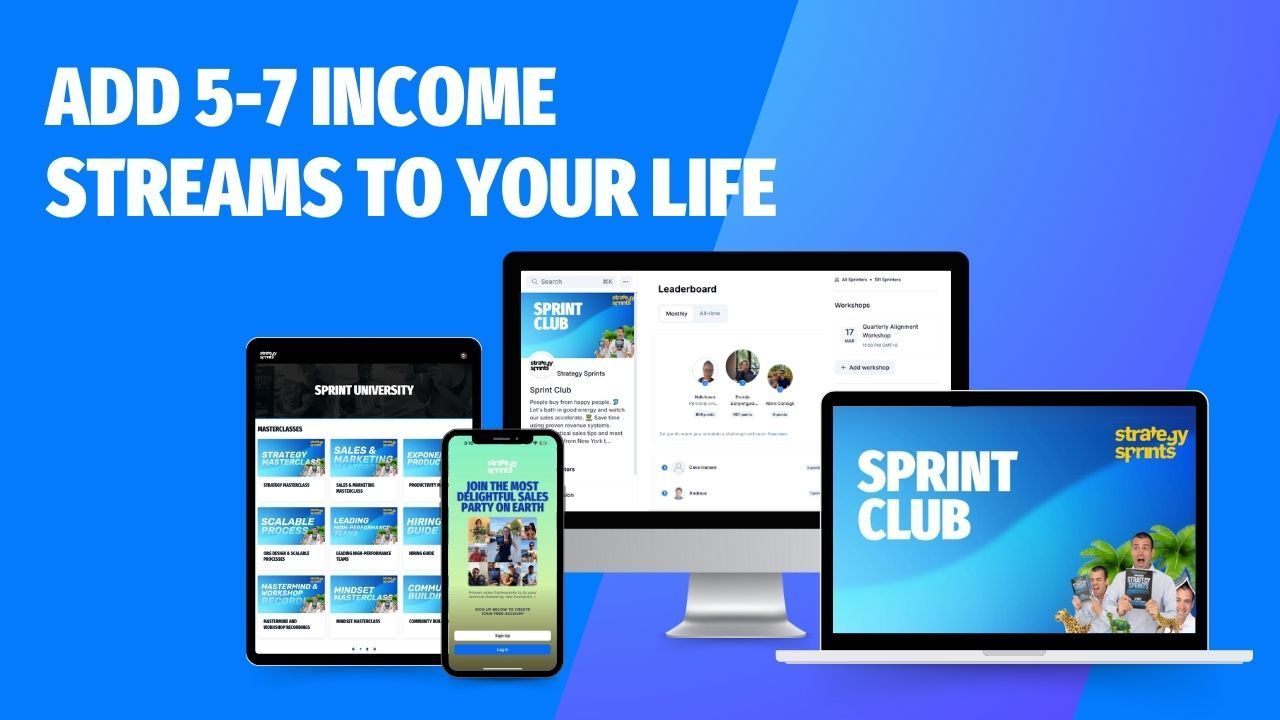
The CEO Weekly Wealth Review with Larissa Kravitz from Investorella
“Money, Honey!” Book link
Check out our Podcast and YouTube Show!
Simon: Let's think of the founder. She founded the company. It's going well. We have a survey at the beginning of the relationship with a client, which asks for the basic facts and their finances. And one question is, what's your CEO salary? And the answer is often that they don't have a CEO salary. So first they use their company as a piggy bank and that has more repercussions. One is that when they tell you their profit rate, they are not telling the profit rate because they are not part of the expenses yet. And the second is when you finally give yourself a salary, how do you decide how high it should be? Industry standard, benchmark? Because you are the founder, you can do what you want, basically. What is the right thing to do?
Larissa: Well and in terms of the right thing to do, I think it's very important to pay yourself, a salary as an entrepreneur, as a CEO. Because one of the things that I've seen, especially with, with startups, with smaller companies and I've made this mistake myself is that the first thing is you cannot live without money. If you try that, as a startup, as an entrepreneur, when you're bootstrapping and you try to live without money in your day to day private life, it is just a huge hassle. It is going to take so much of your focus from the company and what you should be focusing on, instead of on solving the everyday problem of having to pay rent, having to pay for your normal day to day expenses.
And what entrepreneurs sometimes do for tax reasons, is they take money out of the company as director's loans because they're not paying themselves a salary. Now, this is extremely dangerous from a legal perspective because say it doesn't work out and your company fails. And then not only have you not paid yourself a salary for the past three to five years, but you could end up owing the company tens or hundreds of thousands of Euros or dollars. And I've actually seen cases of that. People weren't really aware that's what these director's loans actually meant and how they actually worked. That is not just money you're taking out of the company. The money was usually taken out for their private expenses such as purchasing food or going to restaurants or transport tickets or taxi fares and those kinds of things. Depending on what jurisdiction you're in, there are limits to that. You can always take out a director's loan, but you do have to repay at some point in time. Where is that money going to come from if you've never paid yourself a salary as an entrepreneur? So those are two very important aspects.
You're absolutely correct with what you mentioned: if you do not pay yourself a salary as an entrepreneur, then your profit and your profit margin is not calculated correctly. The other thing is that also depending on what jurisdiction you're in, if you pay yourself a salary, there are other payments tied to that. It's not just income tax, but it's also social security payments, pension and retirement payments that are paid to that. So if you do not pay yourself a salary, you miss all of those things as well, essentially. And those are important in terms of planning for your future. In some cases it's even things like medical insurance, state medical insurance is paid from your salary. So if you don't pay yourself anything, then you might end up having problems of that sort as well, which you do not want. You want to be focusing on your business. You don't want to have to think about how to pay the doctor when you're missing an arm or something like that. You should be focusing on your company and I think it's important to pay yourself a salary. It shouldn't be a hugely high salary, but it should be a salary that provides you with a good life.
Simon: Ok, finding out what the right salaries are. I, to be very honest, when I started, I defined the bare minimum that my family needs for the first year and that was my salary in the second year then. And then I said, when we triple the revenue, I will double it. And every time we triple I will double it. And that's what I did and increased per time. But, really, I had no idea if it compared, you can compare industry by saying if that is a director of a business unit in my field, what would they get? But that's not the same. I ended up calling all my friends who are in similar positions. Asking “Hey, what do you pay yourself?” And I made an average and to compare if I'm doing it right. But is there a correct way of finding out what the amount should be?
Larissa: I would actually do the same and I would look at the industry and make an industry average for that kind of position. Obviously, if you're a small consultancy business just starting out you can't really compare your business to a consultancy that's been around for 20, 30 years. The thing is, as an entrepreneur, you also have to be realistic about your opportunity costs. Even if you love your freedom as an entrepreneur, the opportunity costs, especially in consulting, say if you're a strategy consultant. If you would make a certain amount, 80,000- 90.000 Euros working for a large consultancy and then you become an entrepreneur. And initially when you're starting a business, you're building your business. This might not be something you're able to achieve because you're building your business. But after three, four, or five years, if you can't pay yourself that kind of salary, or if your business does not provide, at least a smaller salary, profit in terms of dividends to you, then you're actually losing money by being an entrepreneur. And that's not really the point of entrepreneurship.
So, after a while, you also have to be very realistic about it because after a while you may say, I could be making a lot more money if I did the same thing working for a company. I might have less freedom to choose my projects, but over a time span of 10, 15, 20 years, an entire career, it might not make sense in terms of the money that you're able to earn. And of course then it's a personal choice between do I want to maximize my income or how important is freedom to me? Am I willing to accept less income for freedom? Or it might actually give you some kind of action signal for your company because you might be saying, well if I did this job within a large organization, I will be earning much more. What is it that I need to do within my smaller company in order to get to those earnings, in order to get to those profits? That's also what you do and your Strategy Sprints program.
Simon: Yeah, that’s the intersection, what is freedom and what is the price of freedom? Basically what we do is to help them really manage the process of growth and of scalability so that they are not the bottleneck anymore for their growth. And usually at the beginning they are the bottleneck. They are piggybacking and they are not yet thinking like something that will industrialize, something that will really work. So what we do is we help them have a scalability mindset from the very beginning so that they grow with scalability in mind because it might come sooner than you think. It might be a 3X, 5X, 10X process even. But maybe you are not ready. So one of the questions that we ask is if you would 10X tomorrow, meaning to have 10 times as many clients call you tomorrow, what would break? What is it that you cannot deliver? That's where we started working with them and systemizing this part. And also the question of purpose. Why did you become an entrepreneur in the first place? What is it in your life and in your professional life that you want to bring into this world? What is it worth to you both economically, in terms of lifestyle and what are you trying to achieve in three years. We found out that all of these questions remain blurry if you don't have a three years vision. We ask them to write down in a couple of pages, what is your business in three years and how that is linked to your life and to the lives of your people, of their families. We even ask them to write down what their families and their surroundings look like, feel like in three years. And why? Because to answer all these questions, what's the price of my freedom? Is it freedom, freedom to do something for me? Or is it freedom from something, from having a boss, from having a nine to five, from having to wear a suit, from something or to something? It's a huge difference. Right? And so the first thing that we do in week one is to help them really jot down in five pages the vision in three years and then the cards start to fall in an order that you can systemize. But that's really the basis of what we do. And now, if I am an entrepreneur and say that I have so much to do, but I learned from Larissa that I should do every week my financial homework. Let's say I have two hours a week, what should I add?
Larissa: Well, I would say it doesn't even take as much as two hours. I think there is an initial setup that may take three, four hours, but once the setup has been done, it can even be done in 30 minutes. First of all, on the private side, it's a good idea to check your investment accounts once a week to see how the securities you've invested in have developed. If there is a need to buy new securities, sell some of the ones you already have, for whatever reason, you might already have a good profit on them or they might've gone the other way. A stop-loss has been triggered. There's new cash there to be invested. You add some additional cash to your investment account, and then you might want to think about, what do I want to buy next or invest more in the securities that are already in my portfolio, or do I want to buy something new? Or do I need to rebalance? Because let's say you have a diversified portfolio, some money in stocks, some money in bonds, some money in commodities, some in listed real estate. If one of these develops much faster than the other price rises, then your pie might get out of balance. So that's rebalancing. That's one thing to check.
Simon: Should you do that yourself, if you're a small entrepreneur, a small company, or should you give it to experts who do it for you?
Larissa: That depends, in terms of FinTech and all the technologies we have at hand now, it is something that you could easily do yourself. If you've already educated yourself enough, although initially it might be a good idea to also have an investment advisor. But you have to know that investment advisors in the long run, live off fees so, that might cost you a lot. So it's always a good idea to educate yourself and also to understand what your investment advisor is telling you. You could start out by having an investment advisor at least to teach you initially or to help you with a setup, or also help you to find a portfolio strategy. But once it's set up, it's something that you can manage quite well yourself. So that's on the private investment side.
The other thing on the corporate side, it is very important to just check your banking balances, especially if you have only one account. If you have several categories, it's easier because you do have to check that all the important payments have been made. And those are salary payments, tax payments, any payments that would have serious consequences to your business if you don't make them on time. Also it's a good idea not just to check if they've been made but also if they've been made correctly because if they've not been made correctly, that might also lead to future hassle because then you might have to call the tax authority or whoever it is that you pay to correct it. So that's also one thing to check for, because then you can intervene and correct it right away.
The other thing to ask yourself is have I reached my financial goals in terms of my budget? If you don't really have a fixed budget, but at least you have the categories and it's the end of the week and you have a budget for client acquisition and from the previous month, you put 5.000 Euros in that category, in that account. And after a week, you've already spent 5.000 Euros. So, then you know, I may have been overzealous with that. There could be a legitimate reason, you do all your client acquisition in week one, but if you're spending money too fast or too slowly, that's something to note. That's also a problem because if you have a separate marketing account for online marketing and there's just too much money there, then you might not be up to date on your marketing plan or all your planned marketing activities. Those are the kinds of things to check for. Am I reaching my goals? How much profit have I made? The other thing is, has everybody paid me who is supposed to pay me? Are there some payments that I might have to chase? Ideally you've already switched to upfront payments.. So it's basically evaluating whether or not you've reached your financial goals, that is the most important point. If it's well set up that would only take 20 to 30 minutes. If you've set up the categories, it's quite easy to do because you just take a look at your accounts and you see there should be zero Euros in that account because I should have spent all my marketing budget that week. Or there should be, you know, 10.000, 12.000 Euros in my financing account because that is the next interest payment that I might have on one of my projects. Or the income account, I should generally have 50.000 to 60.000 Euros because that client should have already paid me. Those things are very important to know about as an entrepreneur to see if you're on track.
Simon: I used to neglect that. When I realized how important that is and especially what the potential is in terms of the art of growing a business which is exactly knowing these elements and putting them together in the alchemy that is creating more than the parts. So when I got this, I was analyzing why I avoided it in the first place? I realized that it creates friction to have your investments there, your banking account there and it's a lot of clicks to go there. So I put them together in my Chrome bar and then it was too much there at the end. My trick, and that may be helpful for other who starts, is I put together a checklist for myself. It's now in my project management system. And every Friday,it notifies me to say, Hey, you have your eight steps. I call it the CEO wealth review. So you have to do your eight steps. Now it tells me, that was my trick. I don't know how you do it.
Larissa: Well, I used to be a treasury manager, so for me it's very natural that I check my bank balances every day. And especially with the mobile banking apps, it's quite easy. And one of the things that I've also noticed when you just have one account and when you don't have these categories, that as an entrepreneur, one of the things you do have to control is a certain amount of discretionary spending. Things you buy because you like them, because they’re fun. It's also important to kind of keep track of those because if you just have one account you don't really know what you’re spending. There might be a special offer on a software you like to use and there might be a lifetime subscription and you're like I really want this because this is something that I needed, and I use it. And then you might spend a few hundred dollars on a lifetime subscription. So those expenses should also be accounted for. Those things can, for some entrepreneurs they can get out of hand, like what I've seen with some companies is with client entertainment or fancy events or those kinds of things. So it's important to keep track of that because especially when things are going well and when your company's growing, it is very easy to get overzealous with fun expenses. That's also important to check for and to say, okay, well, my client entertainment costs, they're all in my client acquisitions account and I don't want to overspend. So if I'm getting to my budgetary limit in that account, then I might want to reconsider choosing a different restaurant or choosing to host events differently. So those are kind of the things to watch out for. But it's basically a check on where I am in terms of my goals, in terms of my roadmap. And I think what you mentioned with a three year roadmap, that is a very good idea to imagine what you want your company to be, where you want to be in three years. And then two, did you use all the goals from that? All the micro goals, four per year, per quarter, per month. And then you can kind of see how far you've advanced with your business.
Simon: This fun category. Actually it was quite important because I always have the plan and the actual and the delta, plan, actual, delta. So it’s always January, January, January, February, February, February, et cetera. And so when I estimate the fun, I'm usually completely wrong because the actual fun is really different from month to month. So I said to myself, wait a moment, what about having more intention in doing that? So now I have this question that I asked myself in a very polar way. What's the spending that really can bring happiness and joy for me and my surroundings? But it's first me and then my surroundings. And then I say to myself, this month it's CrossFit equipment because I love it. Then it's one sports equipment category and is less volatile because it's more intentional. Also when I have one intentional spending category like this sports equipment or just convenience, like living, or holidays with family, it’s convenience, I don't want to think I spend for that. Then it's much easier for me to cut all the other costs. Because then automatically CrossFit is the one fun thing of this month and I will not be overspending there. But of course there is a limit of how much sport equipment you can have in a room. So there is a limit. But the effect is that when friends asked me for tennis, I said no, because I don't have the equipment. So everything is so intentionally focused and it's much easier to cut on everything else. But I know what's going to bring joy in this month. That was something that I found out that can really work to be intentional in your budgeting and in the life that I want to have and the spending that really brings me joy. If I do it with intention it's so much easier not to spend every day on a big cappuccino and all these things that really compound. There will be joy somewhere. And it's with intention.
Larissa: That's more of a personal finance issue, what you mentioned, the bucket system. In March my first book is going to be published. This is a personal investment book mainly targeted towards women, because fewer women than men invest. This is basically an introduction to investment. The title is “Money, Honey!” It will only be published in German right now, and probably be translated into other languages in the future. And it contains a section on personal finance and what you mentioned is the bucket system. This is something you can do as a private individual but also as a corporation or as an entrepreneur. And as a private individual, usually you will have a bucket for fixed costs, variable living costs such as food or transport, savings and investment, debt repayment and the fun bucket. I also like to add a sixth bucket, which I personally think is one of the keys to wealth and that is sharing, charity and donations. And that is something extremely, extremely important. There's a lot of psychological evidence that spending money on other people brings us a lot of joy and a lot of happiness. And I think that has a positive psychological effect. Consciously giving money away is the opposite thought process to the thought process we usually have about money. It's about abundance because normally, when we go through a day we think, I can't afford this. I can't afford this. This is too expensive. Let's say you walk past the wine store, you see really nice wine for 250 Euros. Wow. 250 Euros for a bottle of wine. It's a lot of money. Essentially what you're saying to yourself subconsciously is, I can't afford that. I don't have enough. But if you consciously give away money to charity or just share it with people once a month, you are actually consciously and deliberately, being tied to actions, sending the opposite message to your subconscious. And I think that's very interesting. And the fun bucket. I've had the same experience with a fun bucket and I've actually managed to massively reduce my personal spending because of the fun bucket. Because of the exact phenomenon that you described, because before I was spending unconsciously and now that I have my fun bucket, it's a certain amount every month of my income dedicated towards the fun bucket and I have a separate account and a separate card just for fun. Obviously it's with a mobile bank so I can check it at any point in time and when I see something that I would like to impulsively buy, I look at my fun account. Then I think well actually no, I don't want to spend that money right now because it's not worth 10% of the balance of my fun account because I might want to go to a nice restaurant with my friends or I might want to take a little city trip with my husband. So that actually reigns in your spending.
And I think the other thing is if you restrict your impulsive spending, when you do spend money, it brings you a lot more joy because you've actually sacrificed something else for it. So it's the perceived value of the thing you do buy in your own kind of rises in your own esteem. That's also one of the effects. And I think what I've noticed for instance, with restaurants, that's a typical example, especially for entrepreneurs who go out a lot with their clients. If as a private individual, you don't just go to a restaurant in the evening with your partner or with your family because you're too tired, you don't really want to cook and you just say I'm going to go to a restaurant. But if you consciously spend on nice restaurants, the experience is much better. So the fun bucket is definitely great. And this, as you say, can be brought into the corporate world as well, where what would bring me joy as an entrepreneur and what would bring my employees joy? Because this might be something nice for the office. This might be a team building event. This might be a little day out with, with the crew or something like that. And I think that’s something that could be very good for the team spirit within a company. And usually companies don't do that. How many companies do you think have a chief happiness officer these days?
Simon: Well the title of chief happiness officer is spreading, but if you ask me how the happiness level in corporations is, it's very low.
Larissa: Yeah, I think there should definitely be more chief happiness officers to then have the fun bucket. And that is the budget for the happiness department. I've only heard of very large corporations, very innovative corporations having a chief happiness officer, but that's definitely something that could do a lot of good for especially larger companies in the future. But even as a small company, I think it's very important to sometimes reward yourself and your employees and even the other people you work with. So even with freelancers, to have some kind of nice event and to show people that you appreciate their work and their contribution. So that's a very good thing as well.
Simon: Thank you so much, Larissa, for this whole plethora of insights. We will be summarizing it and putting it where the audience can read it afterwards. Thank you so much.
Larissa: Well, thank you and thank you for having me on your show.
Simon: Thank you. Bye. Sprinters, keep rolling.
Keep Rolling
Simon Severino, CEO Strategy Sprints GmbH
P.S. Entrepreneurial freedom is awesome. It’s also a lot of hard work to get there. And when you are there, it is easy to lose your grip. Our community of 16.000 entrepreneurs is getting stronger and stronger every week, because we amplify each other. We share what works, and drop the rest. We test, refine, improve. Check strategysprints.com to level up your business and have fun doing it.
Get our expert sales tips delivered
By submitting you agree to receive our weekly Strategy Sprints Newsletter as well as other promotional emails from Strategy Sprints. You may withdraw your consent at any time via the “Unsubscribe” link in any email or view our privacy policy at ant time.










